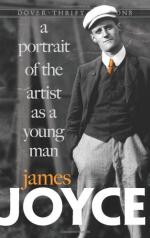—Who knows? said Stephen, smiling. Perhaps Aquinas would understand me better than you. He was a poet himself. He wrote a hymn for Maundy Thursday. It begins with the words PANGE lingua GLORIOSI. They say it is the highest glory of the hymnal. It is an intricate and soothing hymn. I like it; but there is no hymn that can be put beside that mournful and majestic processional song, the VEXILLA Regis of Venantius Fortunatus.
Lynch began to sing softly and solemnly in a deep bass voice:
IMPLETA SUNT QUAE CONCINIT
David FIDELI carmine
DICENDO NATIONIBUS
REGNAVIT A LIGNO Deus.
—That’s great! he said, well pleased. Great music!
They turned into Lower Mount Street. A few steps from the corner a fat young man, wearing a silk neckcloth, saluted them and stopped.
—Did you hear the results of the exams? he asked. Griffin was plucked. Halpin and O’Flynn are through the home civil. Moonan got fifth place in the Indian. O’Shaughnessy got fourteenth. The Irish fellows in Clark’s gave them a feed last night. They all ate curry.
His pallid bloated face expressed benevolent malice and, as he had advanced through his tidings of success, his small fat-encircled eyes vanished out of sight and his weak wheezing voice out of hearing.
In reply to a question of Stephen’s his eyes and his voice came forth again from their lurking-places.
—Yes, MacCullagh and I, he said. He’s taking pure mathematics and I’m taking constitutional history. There are twenty subjects. I’m taking botany too. You know I’m a member of the field club.
He drew back from the other two in a stately fashion and placed a plump woollen-gloved hand on his breast from which muttered wheezing laughter at once broke forth.
—Bring us a few turnips and onions the next time you go out, said Stephen drily, to make a stew.
The fat student laughed indulgently and said:
—We are all highly respectable people in
the field club. Last
Saturday we went out to Glenmalure, seven of us.
—With women, Donovan? said Lynch.
Donovan again laid his hand on his chest and said:
—Our end is the acquisition of knowledge. Then he said quickly:
—I hear you are writing some essays about esthetics.
Stephen made a vague gesture of denial.
—Goethe and Lessing, said Donovan, have written a lot on that subject, the classical school and the romantic school and all that. The Laocoon interested me very much when I read it. Of course it is idealistic, German, ultra-profound.
Neither of the others spoke. Donovan took leave of them urbanely.
—I must go, he said softly and benevolently, I have a strong suspicion, amounting almost to a conviction, that my sister intended to make pancakes today for the dinner of the Donovan family.




